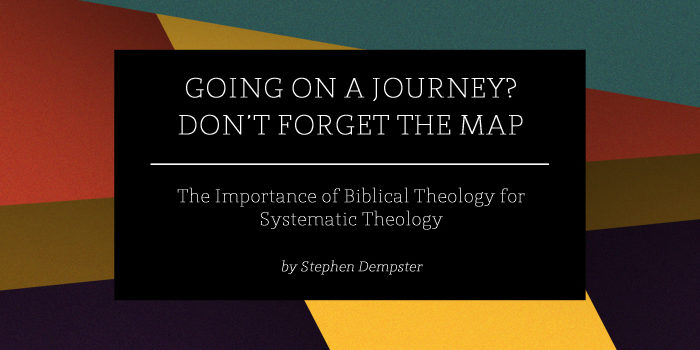
Going on a journey? Don’t forget the map – The importance of biblical theology for systematic theology (Stephen Dempster)
In the new issue of Credo Magazine, “What the Big Story? Why Biblical Theology Should Matter to Every Bible-Reading Christian,” Stephen Dempster has contributed an article called, “Going on a journey? Don’t forget the map – The Importance of Biblical Theology for Systematic Theology.” Dempster is Professor of Religious Studies at Crandall University. He is the author of Dominion and Dynasty: A Biblical Theology of the Hebrew Bible (New Studies in Biblical Theology).
Here is the introduction to Dempster’s article:
Theology as far as many Christians are concerned leaves them cold. For after all, theology requires thinking about God and this is definitely not an age of thinking but one primarily of feeling. And this has affected the church just as well as the society at large. People are interested in “feel good worship,” “feel good sermons,” “feel good prayers” and “feel good stories.” Western culture is thus a therapeutic culture and so unfortunately the church within it has been largely captivated by its sirens.
As anyone knows, however, feelings by themselves cannot be relied on for sound knowledge of anything never mind knowledge of God. Just ask our children about Dad’s feelings about shortcuts and directions in the absence of maps and a GPS. The upward direction of their eyeballs would express their sentiments entirely. The novice who enters the chemistry lab feeling that two different chemicals will produce a good reaction may not survive long enough to get lucky. The jet pilot who relies on her feelings instead of her instrument panel will not get many opportunities to continue to fly.
Theology matters…big time
Thus good thinking about God—theology—is a necessity in a mindless age. If the hazards of relying on feelings are clear in many other areas, how much more dangerous is it to rely on feelings in the area of the soul? Just ask Nadab and Abihu who felt they could offer strange fire to Yahweh in Leviticus 10. They never got a second chance to repeat their mistake. Or ask Uzzah who acted on impulse to steady the ark (2 Sam. 6:1-10)? Or ask the Israelites of Hosea’s generation who suffered a stunted theological education because of the priests’ failure to teach the Torah. As the prophet considered the moral and political chaos of his land, he cried out in anguish: “My people die for lack of knowledge!” (Hos. 4:1-6).
So theology is important for the Christian and absolutely important for the church. Without sound theology Christians will remain captive to their experiences and their feelings, groping about in the dark. C.S. Lewis once used the idea of map making to describe the purpose of theology. He makes the important point that those who rely solely on their feelings or experience do not get very far in their knowledge of God. What they need is a map. He cites as an example the individual who goes down to the beach for a swim in the ocean, and then who wishes to enjoy more of the ocean by taking a journey. What is needed is a map for guidance. The map will show the great expanse, the currents, the land masses, the depths, the shallows, and where the dangers are. The map will help one see new vistas which a swim on one particular beach would never afford. More importantly it will give perspective—it will show where exactly that one particular beach is on the map and what is needed to get to another place, to move out into the great depths of the ocean, to explore new worlds.
Lewis observes that one has to move from the more real to the less real to get a greater experience of the more real: to be more in touch with reality. Thus the individual moves from the swim—his or her experience—to study a piece of colored paper, to get his or her bearings in order to get back to a greater experience of the ocean, than any individual swim in one location could provide. Thus good theology does not rely on one limited experience of God but many generations of the faithful, which have had genuine encounters with God and whose records are produced in the Bible.
Read the rest of Dempster’s article today!
What’s the Big Idea Story?
Why Biblical Theology Should Matter to Every Bible-Believing Christian
When the sixteenth-century Reformation erupted, one of the alarming dangers that became blatantly obvious to reformers like Martin Luther was the pervasiveness of biblical illiteracy among the laity. It may be tempting to think that this problem has been solved almost five hundred years later. However, in our own day biblical illiteracy in the pew continues to present a challenge. Many Christians in our post-Christian context simply are not acquainted with the storyline of the Bible and God’s actions in redemptive history from Adam to the second Adam.
With this concern in mind, the current issue of Credo Magazine strives to take a step forward, in the right direction, by emphasizing the importance of “biblical theology.” Therefore, we have brought together some of the best and brightest minds to explain what biblical theology is, why it is so important, and how each and every Christian can become a biblical theologian. Our hope in doing so is that every Christian will return to the text of Scripture with an unquenchable appetite to not only read the Bible, but comprehend God’s unfolding plan of salvation.
Contributors include: Justin Taylor, Darian Lockett, Edwards Klink III, David Murray, Stephen Dempster, James Hamilton, T. Desmond Alexander, Stephen Wellum, Peter Gentry, G. K. Beale, Graham Cole, and many others.
